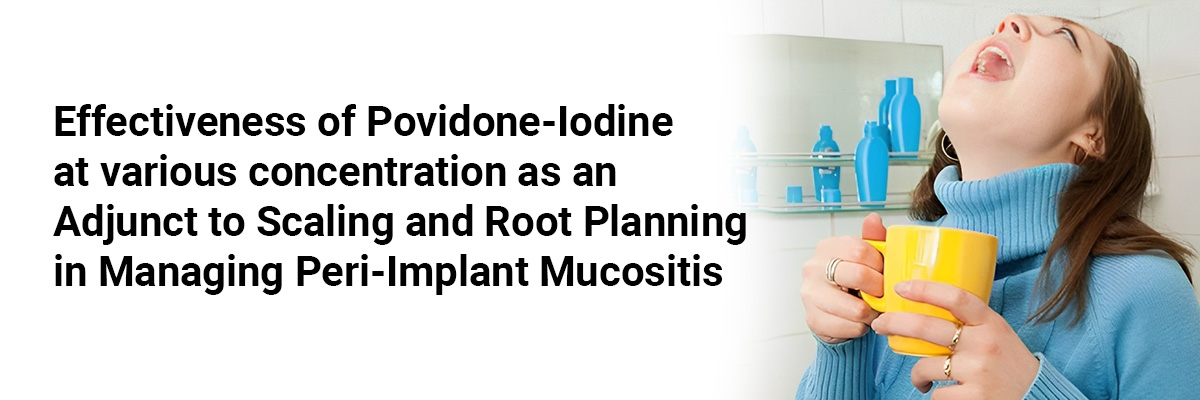

Effectiveness of Povidone-Iodine at various concentration as an Adjunct to Scaling and Root Planning in Managing Peri-Implant Mucositis
The primary approach to managing peri-implant diseases is through mechanical plaque control. Povidone iodine, a potent and wide-ranging antiseptic, is available in different concentrations. A recent research study examined and compared the effectiveness of various povidone iodine concentrations in the treatment of peri-implant mucositis. This study included 60 patients diagnosed with peri-implant mucositis, with 20 participants in each of the three groups: Group 1 (povidone-iodine 0.1%), Group 2 (povidone-iodine 2%), and Group 3 (povidone-iodine 0.10%). The treatment involved scaling and root planing, followed by irrigating the peri-implant sulcus with the corresponding antiseptic, which was repeated weekly for four weeks. The study assessed and compared the Loe and Silness Gingival Index (GI) and Mombelli Modified sulcular bleeding index (BI) at the baseline and after one month and found-
• A significant difference between the three concentrations when compared after one month.
• A significant difference between Group 1 & Group 3 and Group 2 & Group 3 in terms of post- Gingival Index (GI) and post- bleeding index (BI).
• No significant difference between Group 1 and Group 2 in terms of post-GI and post-BI.
In conclusion, the findings from this study demonstrate that both 2% and 10% povidone-iodine exhibit significant improvements in both the gingival index and bleeding index. These results suggest that povidone-iodine can be a valuable adjunct to scaling and root planing when addressing peri-implant mucositis.
This indicates its potential as an effective treatment option for enhancing the management of peri-implant mucositis and underscores its role in promoting better oral health outcomes in patients with implant-related gingival issues.
Source: S Shreenidhi, Rajasekar A. Clinical Efficacy Of Different Concentrations Of Povidone Iodine In The Management Of Peri-Implant Mucositis. Journal of Long-Term Effects of Medical Implants. 2023. DOI: 10.1615/JLongTermEffMedImplants.2023047348
Related FAQs
The Topical Effect of Povidone-Iodine for the Repair of Oral Wounds
The Effectiveness of Low-Concentration Povidone-Iodine as Irrigant for Reducing Postoperative Complications after Third-molar Surgery
Evaluating the Antiviral Properties of Povidone-Iodine in Oral Healthcare
Efficacy of Povidone-Iodine Vs. benzydamine hydrochloride in Preventing Severe Radiation-Induced Oral Mucositis in Head and Neck Cancer Patients Undergoing Concurrent Chemoradiotherapy
Comparative Evaluation of Betadine (Povidone-Iodine), Chlorhexidine (CHX), and Normal Saline in Tooth Extraction: A Study on Dry Socket Incidence and Infection Control
Practical use of povidone‐iodine antiseptic gargle in the prevention and treatment of common oropharyngeal infections
15 Seconds to Safety: PVP-I's Virucidal Efficacy
PVP-I Gargles: A Promising Antiseptic Shield against Whooping Cough
Povidone-iodine gargle prevents respiratory infections

